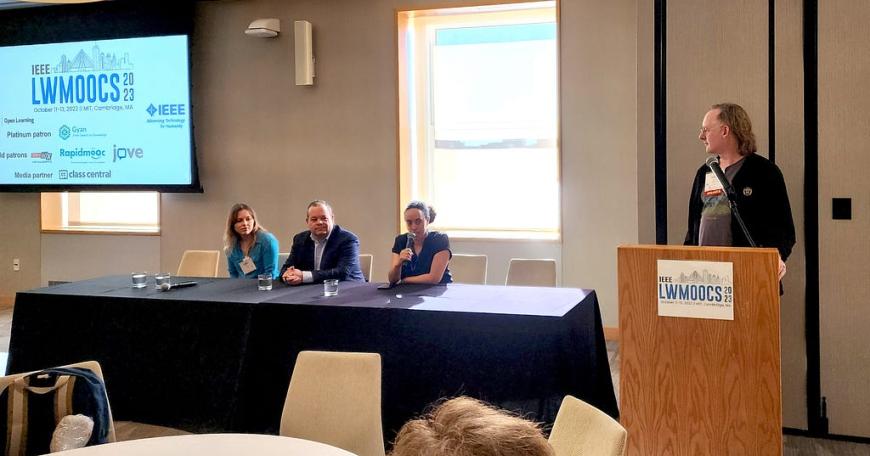
Learning with MOOCs conference shines light on the latest advances in online learning
Academic and industry professionals explore approaches for designing open online courses, understanding the learner experience, and more
By Sara Feijo
What have we learned about online learning since the creation of massive open online courses (MOOCs) well over a decade ago? What are effective strategies to implement these courses in today’s world? How can educators leverage tools and technologies such as generative AI in course development and delivery?
These were just some of the many topics discussed at the 2023 IEEE Learning with MOOCs conference (LWMOOCs) October 11–13 at MIT. The international forum returned to campus for the first time since its inception in 2014, attracting more than 100 academic and industry professionals who were eager to learn about the latest advances in MOOCs.
“Right now is an exciting time for the MOOC community,” says Jessica Sandland SB ’99, PhD ’04, general chair for the conference and principal lecturer and digital learning scientist in materials science and engineering at MIT. “We are seeing two big changes in the educational landscape in general — the change in both students’ and instructors’ expectations of online learning due to their pandemic experiences, and the development of generative AI tools, which are providing both enormous challenges and enormous opportunities to educators.”
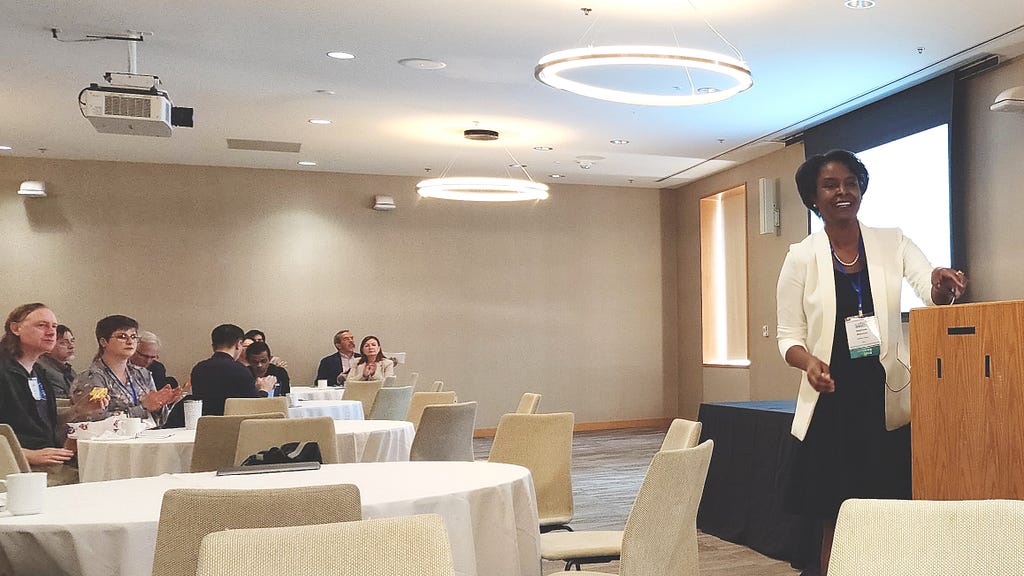
Sparking conversation
The LWMOOCs conference kicked off with a welcome reception featuring work-in-progress posters and demonstrations, including digital tools to enhance music education by Meghan Perdue, MIT digital learning scientist, and augmented reality in mechanical engineering labs by John Liu MS ’12, PhD ’18, digital learning scientist at MIT. Keynote speaker Stephanie Blackmon, associate professor of higher education in the William & Mary School of Education, led a discussion on the concept of problem-solving in MOOCs.
“We try not to be a typical academic learning conference,” says Manuel Castro, past president and president emeritus of the IEEE Education Society and professor of electronics technology at Universidad Nacional de Educación a Distancia in Spain. “The idea for the conference is to have as much discussion and activities as possible, and to try to be as open as possible.”
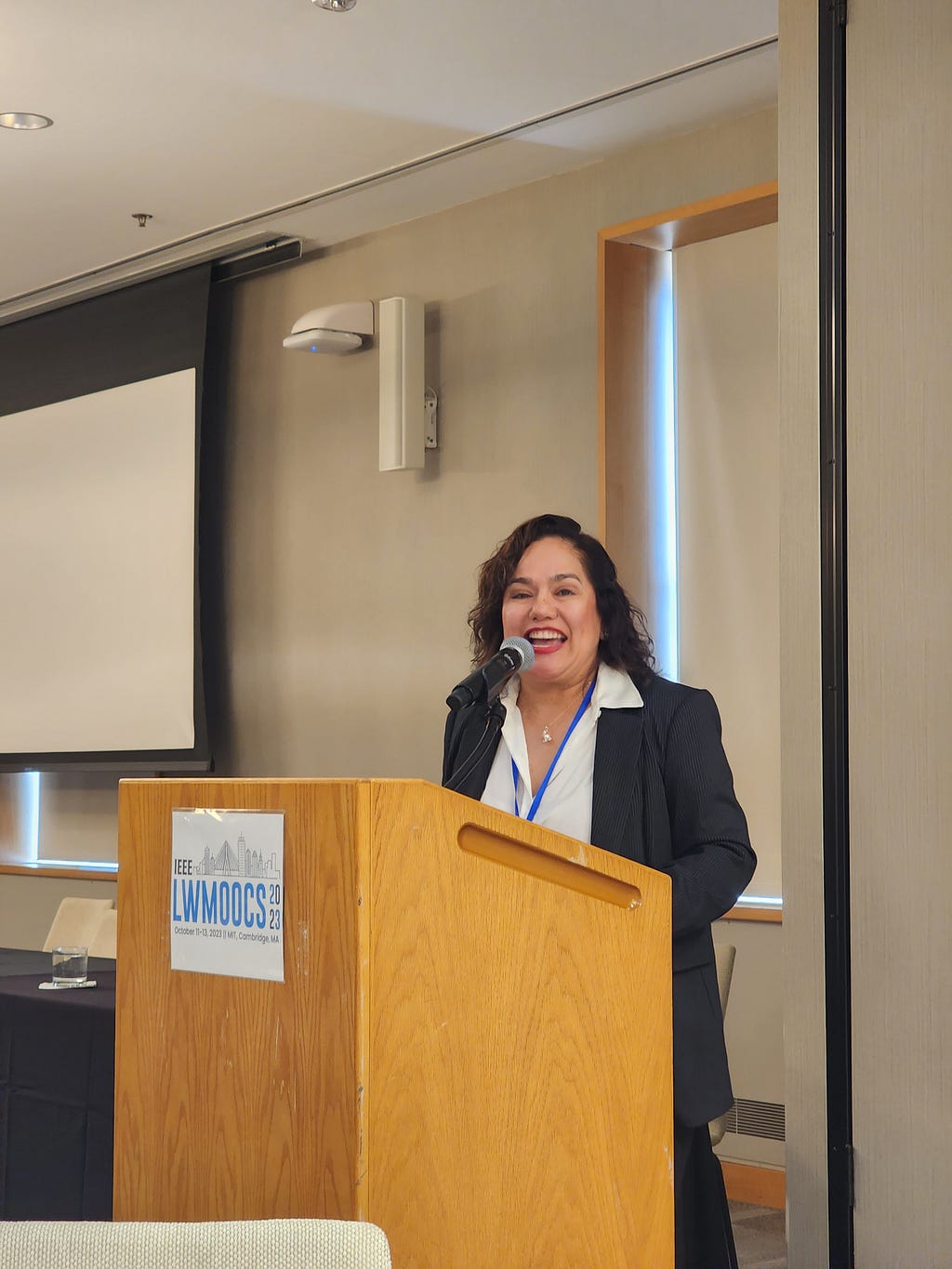
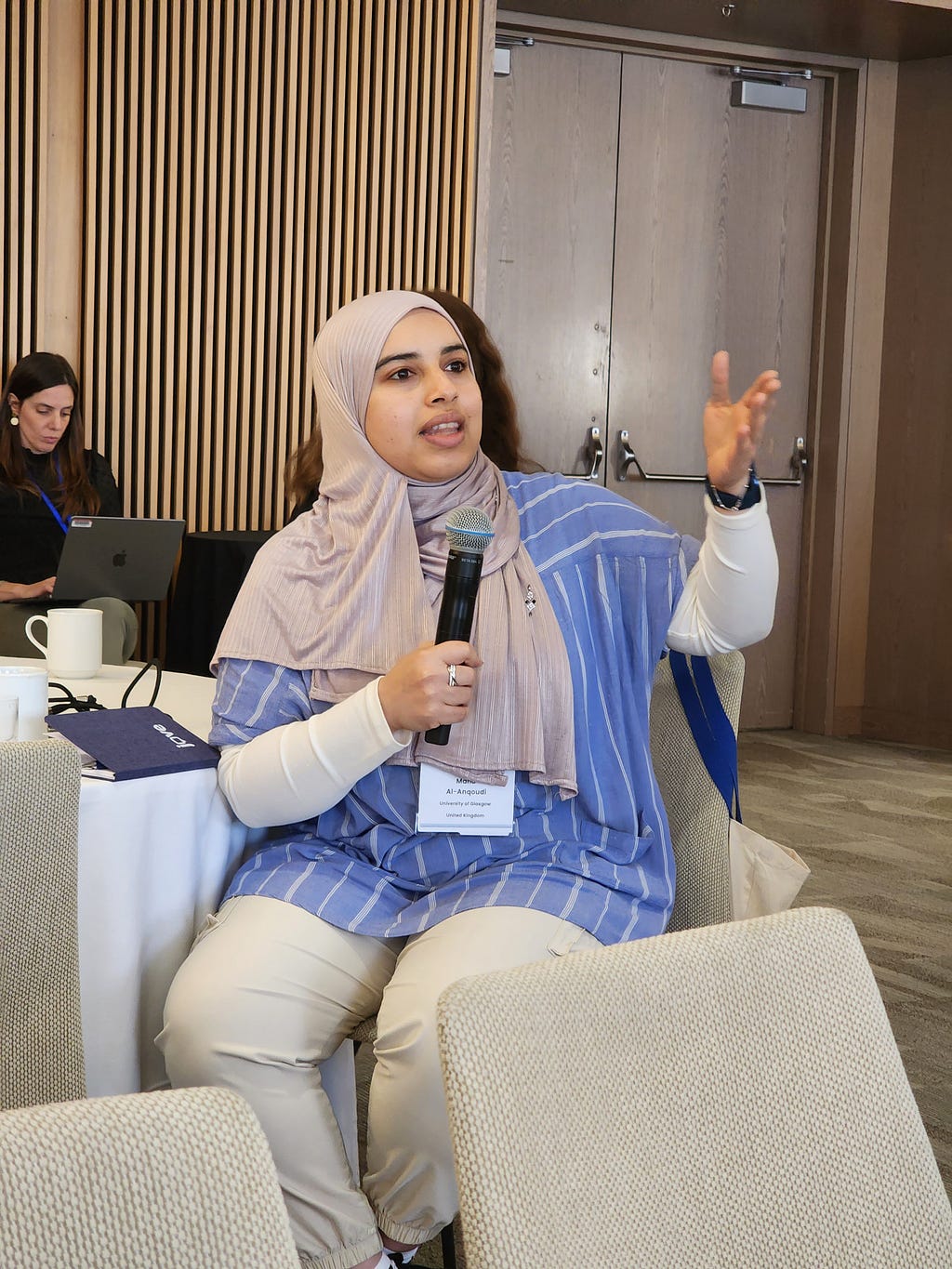
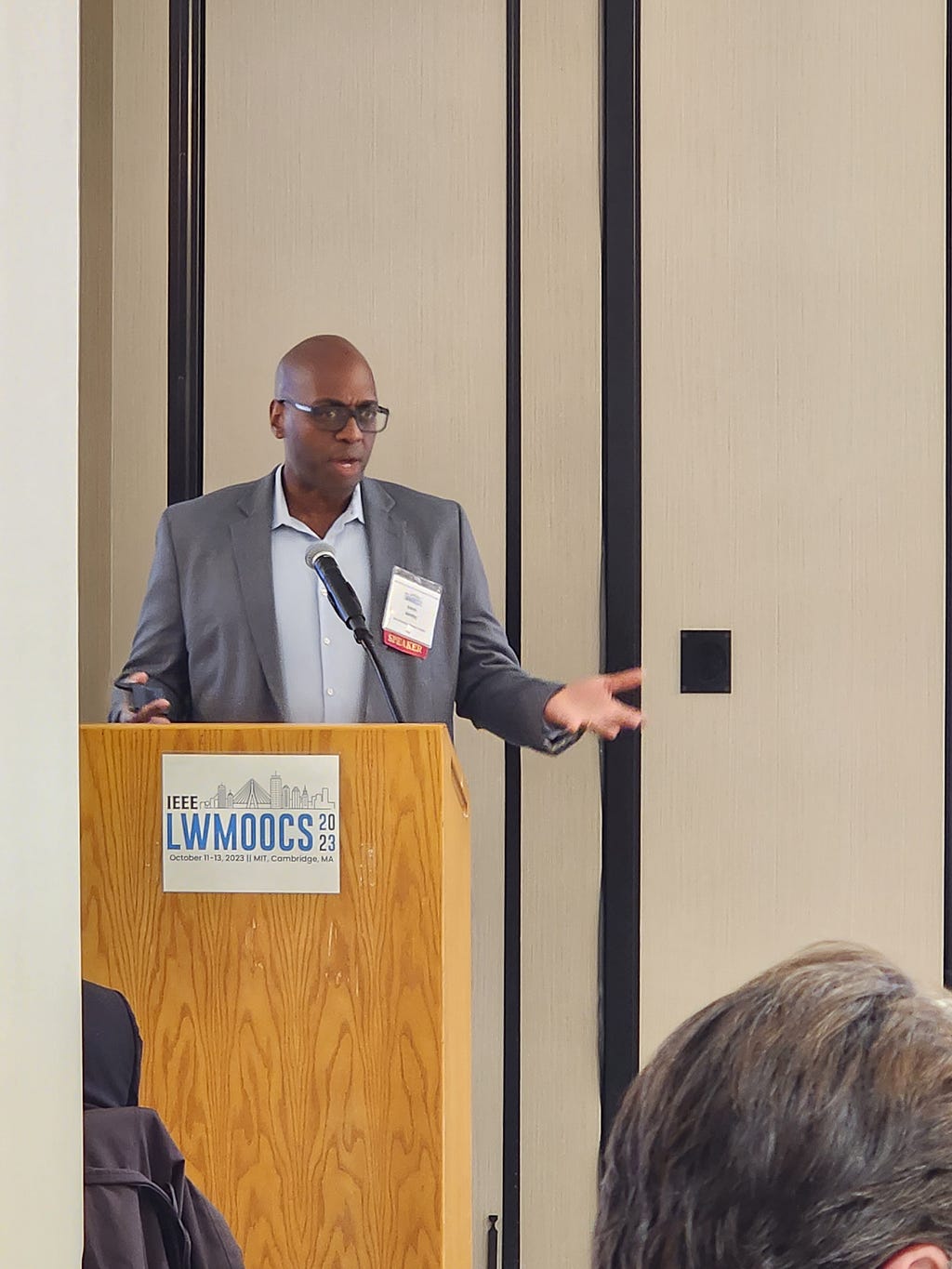
This focus on fostering conversation was evident during the “Impacting Sustainability Education” panel discussion, which sparked a lively dialogue about how open online courses impact sustainability education and what learners can do with the skills they gain from these educational resources.
Panelist Willem van Valkenburg, executive director of TU Delft Extension School in the Netherlands, said learners should walk away from courses thinking about the complete circle of resources. “Every resource you use, you should already think about what’s going to happen when the product is over,” he says.
Alpha Arsano, another panelist and an assistant professor at Northeastern University who worked on MITx’s 4.464x Sustainable Building Design course as a postdoc, stressed the importance of agency and helping learners understand that their decisions have an environmental impact. Instructors, she said, can use comparative illustrations to demonstrate the impact of actions on the environment so that “learners can take home these ideas.”
“Seeing all the examples of great work that others are doing as well as the unclear potential of technology, like AI, I feel like participants could walk away with interest in pushing the limit into new areas again.”
Panelist and marine geologist Nina Gal felt empowered after completing MITx’s 22.811: Sustainable Energy course last year. “I knew I was going to start working in corporate sustainability so I definitely felt more confident in being able to take on that work, and have a better foundation in terms of calculating footprints and what all of the different energy usage terms mean,” says Gal, now a science associate at Industrial Economics, Incorporated.
That message of empowerment is translatable to different disciplines, says Darcy Gordon, a digital learning scientist at MIT Open Learning who attended the discussion and also led a conference workshop about her work on fostering inclusive teaching practices. “The sustainability panel was really interesting because they spoke at various levels of course design and delivery, and I found it hopeful that folks in this space are speaking to messages of empowerment,” Gordon says.
Exploring the future of MOOCs
Throughout the three-day conference, participants joined workshops on AI in education and inclusive teaching, and learned evidence-based practices from experts developing and managing MOOCs and other open online courses.
The conference featured fireside chats between the leaders of the two top MOOC platforms: a chat with Anant Agarwal, professor of electrical engineering and computer science at MIT, chief platform officer of 2U, and founder of edX, and another chat with Jeff Maggioncalda, chief executive officer of Coursera. Dhawal Shah, founder and chief executive officer of Class Central, moderated both fireside chats.
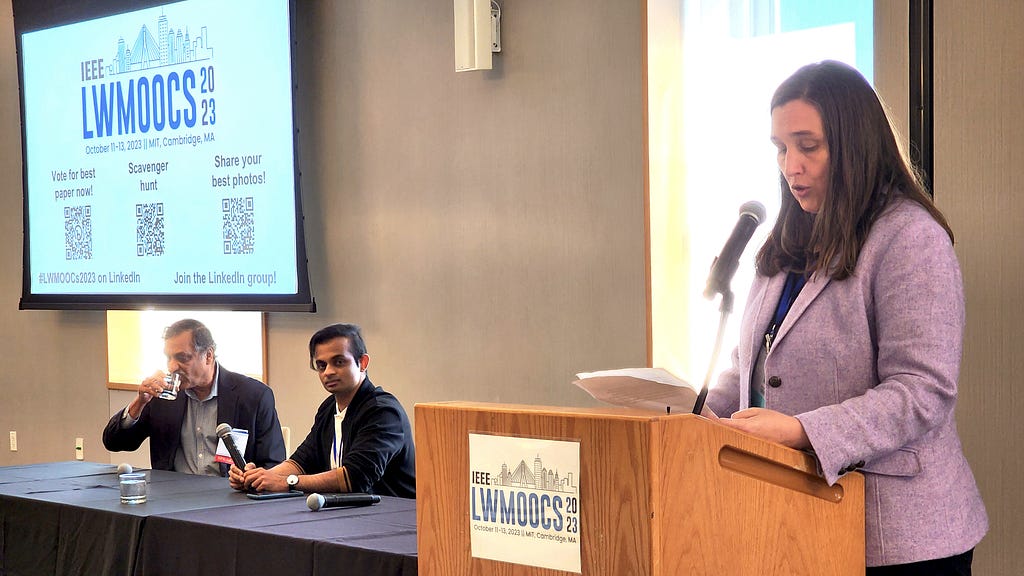
Key takeaways from the conference included:
- strategies to increase the access and impact of open online courses and reaching underserved groups worldwide;
- approaches to designing and revising open online courses;
- using AI to improve course production;
- using analytics to personalize learning experiences and improve learner engagement;
- integrating micro-credentials into degree programs for the success of the lifelong learning and job training landscapes; and
- using innovative technologies such as virtual and augmented reality in courses to enhance learning and provide more realistic practice.
“Now that we have been doing MOOCs at MIT for 10 years — and this conference is a similar age — I hope that participants captured some of that initial enthusiasm, excitement, and optimism for the future that those of us in this space early on had as a driving motivator to impact learning around the world despite skeptics,” says Mary Ellen Wiltrout PhD ’09, general chair for the conference and director of blended and online initiatives, lecturer, and digital learning scientist in biology at MIT. “Seeing all the examples of great work that others are doing as well as the unclear potential of technology, like AI, I feel like participants could walk away with interest in pushing the limit into new areas again.”
“I hope that participants captured some of that initial enthusiasm, excitement, and optimism for the future that those of us in this space early on.”
Elizabeth Huttner, a former MIT digital learning fellow who has attended multiple LWMOOCs conferences, said it was amazing to be at this year’s conference and to have the opportunity to connect with colleagues.
“We’re way past the hype cycle for MOOCs and we’re digging into essential questions that will guide future work, such as: What makes a MOOC successful? How do we incorporate learner perspectives in the design process? How can we foster richer and more productive discussions online? How do we make assessment even more meaningful? How do we use MOOC content in other ways? And so many more,” Huttner says. “I have a learning design background, and I’ve appreciated the practical, action-oriented tips and the focus on learners.”
Learning with MOOCs conference shines light on the latest advances in online learning was originally published in MIT Open Learning on Medium, where people are continuing the conversation by highlighting and responding to this story.

